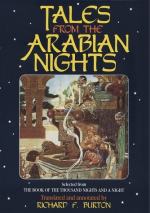Then follow notices of Anderson’s Ms., used by Scott, but which cannot now be traced the Calcutta edition of the first 200 Nights; and of the Wortley Montague Ms. These form M. Zotenberg’s third group of MSS.
M. Zotenberg does not enter into the question of the original form, date and constituents of the primitive work, but concludes that the complete work as we now have it only assumed its present form at a comparatively recent period. But it must not be forgotten that the details, description, manners, and style of the tales composing this vast collection, are undergoing daily alteration both from narrators and copyists.
Then follows an Appendix, in which M. Zotenberg has copied two tales from Galland’s journals, which he took down as related by the Maronite Hanna. One of these is new to me, it is the story of the Three Princes, and the Genius Morhagian and his Daughters (added at the end of this section); and the other is the well-known story of the Envious Sisters.
The remainder of M. Zotenberg’s volume contains the Arabic text of the story of ’Ala Al-Din, or the Wonderful Lamp, with numerous critical notes, most of which refer to Galland’s version. A few pages of Chavis’ text are added for comparison.
The story itself, M. Zotenberg remarks, is modern, giving a faithful picture of Egyptian manners under the reign of the last Mamlouk Sultans. Some expressions which occur in the French Arabic Dictionary of Ellions Bocthor and of A. Caussin de Perceval, are apparently derived from the story of ’Ala Al-Din.
Story of the Three Princes and the Genius Morhagian and His Daughters.
[Reprinted by M. Zotenberg (pp. 53-61) from Galland’s Journal, Ms. francais, No. 15277, pp. 120-131. The passages in brackets are added by the present translator (chiefly where Galland has inserted “etc.”) to fill up the sense.]
When the Sultan of Samarcand had reached a great age, he called the three princes, his sons, and after observing that he was much pleased to see how much they loved and revered him, he gave them leave to ask for whatever they most desired. They had only to speak, and he was ready to grant them whatever they asked, let it be what it might, on the sole condition that he should satisfy the eldest first, and the two younger ones afterwards, each in his turn. The eldest prince, whose name was Rostam, begged the Sultan to build him a cabinet of bricks of gold and silver alternately, and roofed with all kinds of precious stones.
The Sultan issued his orders that very day, but before the roof of the cabinet was finished, indeed before any furniture had been put into it, Prince Rostam asked his father’s leave to sleep there. The Sultan tried to dissuade him, saying that [the roof] ought to be finished first, but the prince was so impatient that he ordered his bed to be removed there, and he lay down. He was reading the Koran




